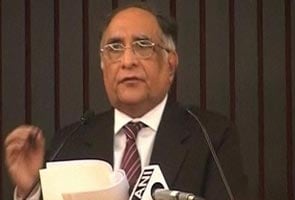
New Delhi:
Chief Justice of India SH Kapadia today said judges should not govern the country or evolve policies and should apply the enforceability test on some verdicts like making "right to sleep" a fundamental right.
Doing some frank introspection on the judiciary's functioning, he also wondered what would happen if the executive refused to comply with the judiciary's directives that may not be enforceable.
"Right to life, we have said, includes environmental protection, right to live with dignity. Now we have included right to sleep, where are we going? It is not a criticism. Is it capable of being enforced? When you expand the right, the judge must explore the enforceability.
"Questions which judges must ask are if it is capable of being enforced. Judges must apply enforceability test. Today, if a judge proposes a policy matter, government says we are not going to follow. Are you going by way of contempt or implement it?" he asked.
Delivering a lecture on "Jurisprudence of Constitutional Structure", he was making an apparent reference to the recent Supreme Court judgement in the Ramlila Maidan police action against Baba Ramdev's supporters in which "Right to Sleep" was declared a fundamental right.
"Judges should not govern this country. We need to go by strict principle. Whenever you lay down a law, it should not interfere with governance. We are not accountable to people. Objectivity, certainty enshrined in the basic principles of the Constitution has to be given weightage," he said, Justice Kapadia said judges should go strictly by the Constitutional principles which clearly demarcate the separation of powers among the judiciary, the legislature and the executive.
Doing some frank introspection on the judiciary's functioning, he also wondered what would happen if the executive refused to comply with the judiciary's directives that may not be enforceable.
"Right to life, we have said, includes environmental protection, right to live with dignity. Now we have included right to sleep, where are we going? It is not a criticism. Is it capable of being enforced? When you expand the right, the judge must explore the enforceability.
"Questions which judges must ask are if it is capable of being enforced. Judges must apply enforceability test. Today, if a judge proposes a policy matter, government says we are not going to follow. Are you going by way of contempt or implement it?" he asked.
Delivering a lecture on "Jurisprudence of Constitutional Structure", he was making an apparent reference to the recent Supreme Court judgement in the Ramlila Maidan police action against Baba Ramdev's supporters in which "Right to Sleep" was declared a fundamental right.
"Judges should not govern this country. We need to go by strict principle. Whenever you lay down a law, it should not interfere with governance. We are not accountable to people. Objectivity, certainty enshrined in the basic principles of the Constitution has to be given weightage," he said, Justice Kapadia said judges should go strictly by the Constitutional principles which clearly demarcate the separation of powers among the judiciary, the legislature and the executive.
Track Latest News Live on NDTV.com and get news updates from India and around the world

